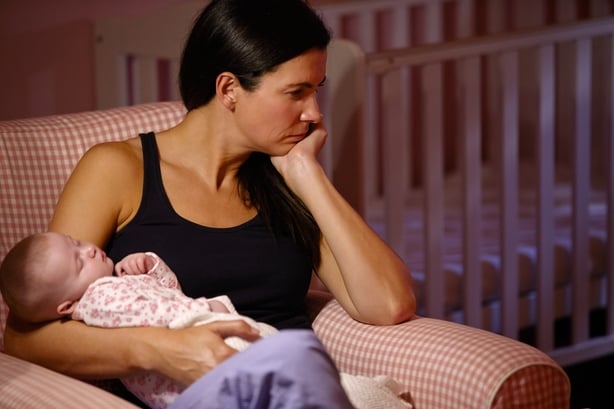Chrissy Teigen has opened up about suffering from postnatal depression. In an essay for Glamour, the model writes on how she was diagnosed with postnatal depression several months after the birth of her daughter, Luna.
We spoke with Dr. Brendan O'Shea on the symptoms of this often ignored condition, and what can be done to help women who are suffering.
Chrissy Teigen's Emotional Essay
In her essay, Teigen describes how to the masses, she seemed like 'the happiest person on the planet' but underneath the celebrity image experienced an unexplained unhappiness.
"How can I feel this way when everything is so great?" she writes.
"I couldn’t figure out why I was so unhappy. I blamed it on being tired and possibly growing out of the role: “Maybe I’m just not a goofy person anymore. Maybe I’m just supposed to be a mom.”
After months of unhappiness, indifference to work, pain and fatigue, a conclusion was finally drawn when Teigen and her husband, singer John Legend, went to their doctor where she got her diagnosis: postnatal depression and anxiety.
"I’m speaking up now because I want people to know it can happen to anybody and I don’t want people who have it to feel embarrassed or to feel alone" she writes.
❤ Thank you, @glamourmag, for helping me discuss my postpartum depression with your readers. https://t.co/zIxKDWGuTt
— christine teigen (@chrissyteigen) March 6, 2017
The Symptoms and Signs of Post Natal Depression
"Most commonly in general practice the experience and feelings are those of not being able to cope, profound tiredness and anxiety" says Dr Brendan O'Shea.
"Overwhelming tearfulness, withdrawal from the things that usually are enjoyed and sleep disturbance despite the fatigue, all increase the probability that what is being discussed between doctor and mother is in fact a clinically significant depression."
The Causes?
"Having a baby in Ireland in 2017 is really challenging; and the challenge is unfairly or asymmetrically distributed on women," O'Shea says.
"Just about all the mothers who attend our practices have a deep and overwhelming desire to provide 110% for their child, and they all operate under a really intense performance anxiety to do so."
O'Shea says that the mobile society, where people often move around for education and jobs, has now changed the experience for mothers who find themselves 'toughing it out on your own'.
Without the help of experienced mothers, a granny or bigger sisters for example, this can prove a serious challenge to some mothers who can find themselves isolated.

O'Shea says that GPs know the people who attend them as individuals, and that "many are well placed to identify if there are risk factors for postpartum depression, and given a little time, can advise steps to prevent, raise awareness and make an earlier diagnosis.
"But of course, getting that little time in a very stretched system is a real challenge for us in general practice."
Ways Of Prevention
"Anticipate that it might happen," O'Shea advises.
"Read up about it during pregnancy, as there is a 20% it may happen to you, and more than that if it happened on a previous pregnancy, or if you have had a previous episode of depression - a lot of us have!"
"If you have become socially isolated, if you are a single handed Mum, and if you are struggling financially, follow up your routine visits with your GP and Practice Nurse."
"If you have just moved into a new area, and you are in this phase of your life, ensure that your working relationship with your General Practice is working for you."
Simple lifestyle choices to tackle the issue include:
- Exercise as much as your postnatal condition allows
- Be careful with use of alcohol - it transiently alleviates anxiety, but makes the depression worse.
- Recognise that you need to talk - and to cry
- Where possible, have a reciprocal interest in a few friends and a partner
"Finally, if it is beginning to happen to you (or your daughter or sister) recognise it for what it is - an important medical condition that needs to be" O'Shea says. "It can be managed effectively and usually successfully - the sooner the better".
Dr. Bernard O'Shea is Director of the Post Graduate Resource Centre of the Irish College of General Practitioners. For more information on Postnatal Depression, visit your local GP or refer to www.hse.ie.
To read the entire essay from Chrissy Teigen, click here.
If you are keen for up-to-the-minute news on food, fashion, parenting, fitness, travel, recipes and more – the Lifestyle Weekly Email will put a smile on your face when it comes into your inbox every Thursday.


